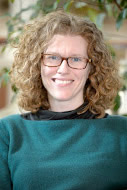By Kristin Koutmou
 Sharon McGee Crary is a Professor of Chemistry and Biochemistry and Director of the Global Health Program at DePauw University in Greencastle, Indiana. She received her Ph.D. from Duke University where she studied the mechanism of RNase-P–catalyzed cleavage of tRNA in the laboratory of Professor Carol Fierke. Dr. Crary continued her training in Viral Special Pathogens at the Centers for Disease Control and Prevention (CDC) in the laboratory of Dr. Stuart Nichol. Her experience as an undergraduate at Williams College (Williamstown, MA) convinced her of the value of learning science in a liberal arts environment, and ultimately inspired her to take a job at DePauw University.
Sharon McGee Crary is a Professor of Chemistry and Biochemistry and Director of the Global Health Program at DePauw University in Greencastle, Indiana. She received her Ph.D. from Duke University where she studied the mechanism of RNase-P–catalyzed cleavage of tRNA in the laboratory of Professor Carol Fierke. Dr. Crary continued her training in Viral Special Pathogens at the Centers for Disease Control and Prevention (CDC) in the laboratory of Dr. Stuart Nichol. Her experience as an undergraduate at Williams College (Williamstown, MA) convinced her of the value of learning science in a liberal arts environment, and ultimately inspired her to take a job at DePauw University.
Dr. Crary works with undergraduate students to study how the nucleoprotein of Ebola virus associates with the viral RNA. She explained, “the most important impact of my research is that I am getting undergraduate students, from a variety of backgrounds, excited and informed about research.” For her, “college is about opening doors and providing opportunities. I think if a trainee is considering a career at a PUI [Primarily Undergraduate Institution], he/she should be aware that their career will not be so much about advancing their own research interests as it will be about creating future scientists and scientifically-literate citizens.” She added, “This isn’t to say that you cannot do good, important research at a PUI. And this career is extremely fulfilling, especially if you love to teach —you can play a very important role in helping students find their paths.”
“It was impossible not to notice the difference in wealth between my home and northern Uganda,
so I knew I had to help at least a little”
A long-time member of the RNA Society, Dr. Crary appreciates how nurturing the community is. “The Society is full of brilliant people who love what they do and want others to love it too—they share their enthusiasm and their knowledge freely.” At the annual meetings, she continued, “I always love finding people from the generations before me to pick their brains and learn their stories. As a graduate student, I would try to learn about the human side of the RNA scientists I admired. I found that after the poster sessions, over a beer, you could always get an interesting story out of people. The most memorable for me might be Norm Pace telling some crazy story of hanging upside down in a waterfall while caving.”
In addition to studying Ebola and training the next generation of scientists, Dr. Crary also runs Social Promise, a non-profit organization that she began after traveling to Africa with a team from the CDC as a post-doctoral fellow. She explained, “The 2000-2001 outbreak was already winding down by the time I arrived at St. Mary’s Lacor Hospital in Gulu, Uganda, where the CDC team was stationed. This meant that I had plenty of samples to analyze by RT-PCR every day, but, fortunately, no one was dying of Ebola viral disease anymore. So, while it was of course a stressful situation, it was not as emotionally draining for me as it was for the first team, who had seen their Ugandan colleagues – doctors and nurses – die alongside hundreds of patients. As a result, I was able to spend time getting to know the region, and while my PCR would run in the afternoon, I would drive to a local orphanage where I spent time with the 80 children living there. I learned that in the 20 years prior to the Ebola outbreak, the region had suffered from atrocities, leading Doctors Without Borders to list northern Uganda as one of the Top 10 Most Underreported Humanitarian Stories of 2004. It was impossible not to notice the difference in wealth between my home and northern Uganda, so I knew I had to help at least a little. I eventually incorporated Social Promise as a nonprofit organization, and we now raise over $100,000 annually in funds to help Uganda.” To learn more about Dr. Crary’s efforts in Uganda, visit www.socialpromise.org.
Dr. Crary’s favorite RNA is the HDV ribozyme. “It exemplifies one of the things that amazes me most about RNA—how such a seemingly simple molecule can do so much.” Dr. Crary is not on social media, but if you want to discuss life as a professor at a PUI or running Social Promise, you can contact her at [email protected] or [email protected], “depending on which side you are curious about”.
